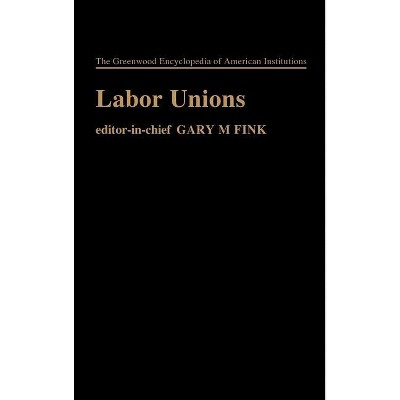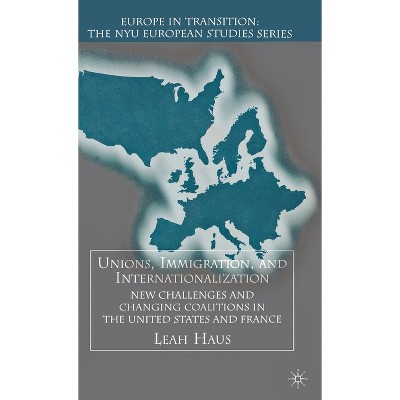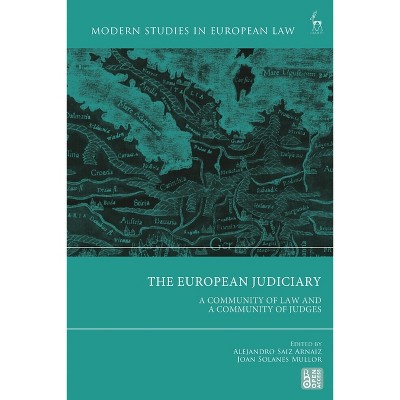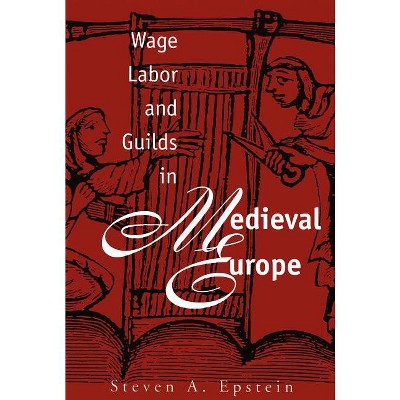Sponsored

European Labor Unions - by Joan Campbell (Hardcover)
In Stock
Sponsored
About this item
Highlights
- European Labor Unions provides a picture of the evolution of trade unionism in Europe.
- About the Author: JOAN CAMPBELL is adjunct associate professor in the Department of History at the University of Toronto.
- 672 Pages
- Political Science, Labor & Industrial Relations
Description
About the Book
European Labor Unions provides a picture of the evolution of trade unionism in Europe. It includes 31 national chapters representing all European countries at the time the book was planned in 1988, with the exceptiuon of Andorra, Liechtenstein, and Monaco, but including such countries as Turkey, Iceland, and Yugoslavia. Additionally, there is a chapter on European regional organizations. The fall of the Berlin Wall in 1989 inaugurated a period of uncertainty in Central and Eastern Europe that has involved dramatic changes in national boundaries. Rather than attempting to adapt to a process that showed no sign of stabilizing, it was decided to retain the volume's original chapter structure, while encouraging the authors writing about the affected regions to explore the initial implications of these momentous changes for the trade union movement.
European Labor Unions summarizes a great deal of information, much of it not previously available in English. In addition, it contains the first scholarly account of certain labor organizations in any language. Although coverage is selective, the country chapters generally include profiles of all important national trade union federations and confederations, and of individual unions representing the most significant ideological and political variants, as well as some of the major national occupational sectors. Both defunct and existing organizations are included. Efforts have also been made to discuss and, where possible, to illustrate developments affecting white-collar workers, women, and religious or national minorities. The volume concludes with an appendix of chronologies and a fully cross-referenced index.
Book Synopsis
European Labor Unions provides a picture of the evolution of trade unionism in Europe. It includes 31 national chapters representing all European countries at the time the book was planned in 1988, with the exceptiuon of Andorra, Liechtenstein, and Monaco, but including such countries as Turkey, Iceland, and Yugoslavia. Additionally, there is a chapter on European regional organizations. The fall of the Berlin Wall in 1989 inaugurated a period of uncertainty in Central and Eastern Europe that has involved dramatic changes in national boundaries. Rather than attempting to adapt to a process that showed no sign of stabilizing, it was decided to retain the volume's original chapter structure, while encouraging the authors writing about the affected regions to explore the initial implications of these momentous changes for the trade union movement.
European Labor Unions summarizes a great deal of information, much of it not previously available in English. In addition, it contains the first scholarly account of certain labor organizations in any language. Although coverage is selective, the country chapters generally include profiles of all important national trade union federations and confederations, and of individual unions representing the most significant ideological and political variants, as well as some of the major national occupational sectors. Both defunct and existing organizations are included. Efforts have also been made to discuss and, where possible, to illustrate developments affecting white-collar workers, women, and religious or national minorities. The volume concludes with an appendix of chronologies and a fully cross-referenced index.Review Quotes
?This book meets its objectives well, given the immense field it seeks to cover. It brings together a lot of information that has hitherto been inaccessible, at least to English-speakers, and it is particularly good on early developments. It is a very useful book for people concerned with labor movements, and it deserves a place in the library wherever comparative industrial relations is taught. Managers, union officials, and government officials with international responsibilities will also find it valuable.?-Industrial and Labor Relations Review Relations Review
?This latest work on organized labor fills a gap in the literature of labor history. The format provides for a history of the labor movement in each of 31 European countries, including members of the former Eastern Bloc, with a bibliography with many, if not most, of the sources in the native language. Each of the entries is followed by a list of major labor unions with descriptions varying in length from one sentence to two pages. Academic contributors from over 20 countries wrote the scholarly entries. . . . A search . . . for dictionaries and encyclopedias on European trade unions found nothing remotely near this title in English. . . . Highly recommended.?-Library Journal
?This valuable reference work is a collection of essays by various authors describing European labor unions.?-Choice
"This book meets its objectives well, given the immense field it seeks to cover. It brings together a lot of information that has hitherto been inaccessible, at least to English-speakers, and it is particularly good on early developments. It is a very useful book for people concerned with labor movements, and it deserves a place in the library wherever comparative industrial relations is taught. Managers, union officials, and government officials with international responsibilities will also find it valuable."-Industrial and Labor Relations Review Relations Review
"This valuable reference work is a collection of essays by various authors describing European labor unions."-Choice
"This latest work on organized labor fills a gap in the literature of labor history. The format provides for a history of the labor movement in each of 31 European countries, including members of the former Eastern Bloc, with a bibliography with many, if not most, of the sources in the native language. Each of the entries is followed by a list of major labor unions with descriptions varying in length from one sentence to two pages. Academic contributors from over 20 countries wrote the scholarly entries. . . . A search . . . for dictionaries and encyclopedias on European trade unions found nothing remotely near this title in English. . . . Highly recommended."-Library Journal
About the Author
JOAN CAMPBELL is adjunct associate professor in the Department of History at the University of Toronto. She is the author of Joy in Work, German Work: The National Debate, 1800-1945 (1989) and The German Werkbund: The Politics of Reform in the Applied Arts (1978).Shipping details
Return details
Trending Non-Fiction











